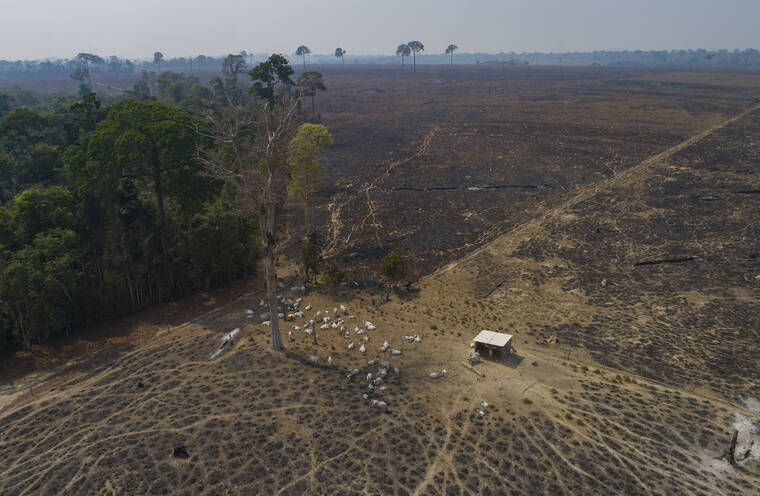RIO DE JANEIRO — Brazil’s government will accelerate its timeline by two to three years to completely eliminate illegal deforestation, Vice President Hamilton Mourão told foreign press reporters on Monday.
Mourão said the Brazilian delegation to the upcoming U.N. climate talks in Glasgow will announce its target of zero illegal logging by 2027 or 2028, sooner than the 2030 goal President Jair Bolsonaro presented at the White House-led climate summit in April.
“A more ambitious goal in terms of reducing illegal deforestation in a shorter time would be, in my opinion, extremely welcome by the international community,” Mourão, who coordinates the government’s Amazon Council, said in a video call. “And it would make clear the government’s commitment to work to impede climate change from hurting life on earth.”
The 2030 goal already represented a nod to U.S. President Joe Biden, who had called out Brazil’s environmental track record on the campaign trail last year. For his part, Bolsonaro campaigned in 2018 promising to unlock the vast resources of the Amazon and downplaying the rights and desires of Indigenous people to leave vast territories untouched. His stance is widely seen as having emboldened illegal logging and wildcat mining that sent deforestation surging and caused global outcry.
Bolsonaro has reeled in such contentious rhetoric as he seeks to rehabilitate Brazil’s tattered environmental image abroad and project responsible stewardship. His critics have warned that his shift is disingenuous and that recent months of encouraging data that indicated less deforestation don’t necessarily represent a trend.
For several months, the Brazilian space agency’s satellites recorded fewer deforestation alerts in the Amazon than the same months in 2020. At the United Nations in September, Bolsonaro credited his administration’s redoubled efforts for the plunge of alerts the prior month.
But the number of alerts in September was roughly flat year-on-year, and preliminary data for October shows it on track to far outpace the destruction of the same month last year.
Earlier this month, Mourão said that the three-month deployment of 3,000 soldiers to the Amazon rainforest to prevent deforestation and man-made fires was coming to an end and wouldn’t be extended.
Mourão told the foreign press on Monday that the administration continues to hold that the Amazon should be developed — but in a manner congruent with a view toward sustainability and arresting climate change, and in observance of Brazilian law.
Asked about the ongoing dispute over the double counting of carbon credits — in both the nation offsetting emissions and the nation buying the offsets — Mourão initially said the government is opposed, which would mark a change in the country’s stance. Nations in Glasgow will address potentially closing loopholes that allow for double counting; that would force countries like Brazil to decide if they count emissions reductions toward their own goals, or the sale of reductions abroad to another country’s goals.
“Double counting, I have absolute certainty we don’t agree with that there,” he said. “We don’t support that under any hypothesis.”
Pressed further for clarification about whether the government was shifting its position, he said he wasn’t privy to the delegation’s negotiation strategy.
“It’s not up to me to unravel all the nuances of that strategy. You know, it is a negotiation, and it is being done with that ‘push and pull,’” Mourao said, adding that he hopes to reach consensus that yields “mutual benefits.”
Experts have accused Brazil of adjusting its emissions targets last year in a way that would allow it to release more greenhouse gas into the atmosphere, unlike most other nations, which have stepped up ambitions.
“Brazil has made a significantly worse proposal,” said Niklas Hoehne of the Berlin-based New Climate Institute. The government has proposed cutting emissions 43% by 2030 from the level 25 years earlier, but last year significantly increased the estimate for its baseline, making the target easier to accomplish.
——— AP reporter Frank Jordans contributed from Berlin.


